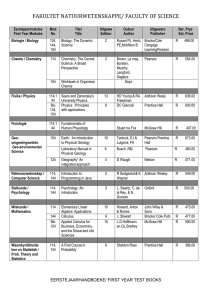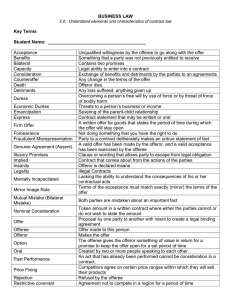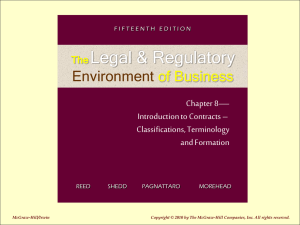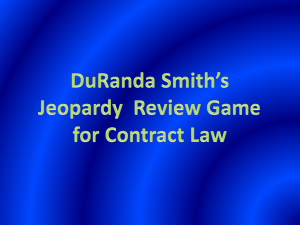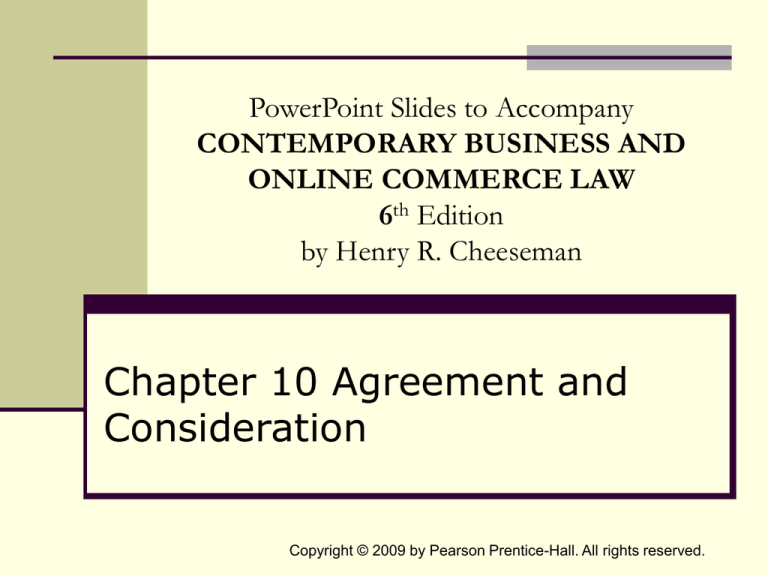
PowerPoint Slides to Accompany
CONTEMPORARY BUSINESS AND
ONLINE COMMERCE LAW
6th Edition
by Henry R. Cheeseman
Chapter 10 Agreement and
Consideration
Copyright © 2009 by Pearson Prentice-Hall. All rights reserved.
Introduction
Contracts are voluntary agreements
between the parties.
One party makes an offer that is accepted
by the other party.
Without mutual assent, there is no
contract.
Copyright © 2009 by Pearson Prentice-Hall. All rights reserved.
10 - 2
Agreement
Agreement
The manifestation by
two or more persons
of the substance of a
contract
Parties Involved
Offeror
Person who makes
an offer
Offeree
Copyright © 2009 by Pearson Prentice-Hall. All rights reserved.
Person to whom an
offer has been made
10 - 3
Offer
“The manifestation of willingness to enter
into a bargain, so made as to justify
another person in understanding that his
assent to that bargain is invited and will
conclude it.”
[Section 24 of the Restatement (Second) of Contracts]
Copyright © 2009 by Pearson Prentice-Hall. All rights reserved.
10 - 4
Requirements of an Offer
For an offer to be effective:
1. The offeror must objectively intend to be
bound by the offer.
2. The terms of the offer must be definite or
reasonably certain.
3. The offer must be communicated to the
offeree.
Copyright © 2009 by Pearson Prentice-Hall. All rights reserved.
10 - 5
Objective Intent
The intent to enter into a contract is
determined using the objective theory of
contracts.
i.e., whether a reasonable person viewing the
circumstances would conclude that the parties intended
to be legally bound
Offers that are made in jest, anger, or
undue excitement do not include the
necessary objective intent.
Copyright © 2009 by Pearson Prentice-Hall. All rights reserved.
10 - 6
Definiteness of Terms (1 of 3)
The terms of an offer must be clear
enough to the offeree to be able to decide
whether to accept or reject the terms of
the offer.
If the terms are indefinite, the courts
cannot enforce the contract or determine
an appropriate remedy for its breach.
Copyright © 2009 by Pearson Prentice-Hall. All rights reserved.
10 - 7
Definiteness of Terms (2 of 3)
An offer (and contract) must contain the
following terms:
Identification of the parties
Identification of the subject matter
and quantity
Consideration to be paid
Time of performance
Copyright © 2009 by Pearson Prentice-Hall. All rights reserved.
10 - 8
Definiteness of Terms (3 of 3)
Implied Terms
The court can supply a missing term if a
reasonable term can be implied.
Terms that are supplied in this way are
called implied terms.
Copyright © 2009 by Pearson Prentice-Hall. All rights reserved.
10 - 9
Communication
An offer cannot be
accepted if it is not
communicated to the
offeree by the offeror
or a representative or
agent of the offeror.
Copyright © 2009 by Pearson Prentice-Hall. All rights reserved.
10 - 10
Special Offer Situations:
Advertisements
A general advertisement is an
invitation to make an offer.
A specific advertisement is an offer.
Copyright © 2009 by Pearson Prentice-Hall. All rights reserved.
10 - 11
Special Offer Situations: Rewards
An offer to pay a reward is an offer to
form a unilateral contract.
To collect a reward, the offeree must:
1. Have knowledge of the reward offer prior to
completing the requested act
2. Perform the requested act
Copyright © 2009 by Pearson Prentice-Hall. All rights reserved.
10 - 12
Special Offer Situations: Auctions
Auction With Reserve
Unless expressly
stated otherwise, an
auction is an auction
with reserve, i.e., the
seller retains the right
to refuse the highest
bid and withdraw the
goods from auction
Auction Without
Reserve
An auction in which
the seller expressly
gives up his or her
right to withdraw the
goods from sale and
must accept the
highest bid
Copyright © 2009 by Pearson Prentice-Hall. All rights reserved.
10 - 13
Termination of an Offer (1 of 3)
Revocation of the Offer by the Offeror
Withdrawal of an offer by the offeror terminates the offer
An offeror can revoke an offer at any time prior to its
acceptance by the offeree
Rejection of the Offer by the Offeree
Express words or conduct by the offeree that rejects an
offer
Rejection terminates the offer
Copyright © 2009 by Pearson Prentice-Hall. All rights reserved.
10 - 14
Termination of an Offer (2 of 3)
Counteroffer by the Offeree
A response by an offeree that contains terms and
conditions different from or in addition to those of the
offer
A counteroffer terminates an offer
Destruction of the Subject Matter
The offer terminates if the subject matter of the offer is
destroyed through no fault of either party prior to its
acceptance
Copyright © 2009 by Pearson Prentice-Hall. All rights reserved.
10 - 15
Termination of an Offer (3 of 3)
Death or Incompetency of the Offeror or Offeree
The death or incompetency of either party terminates
the offer
Supervening Illegality
The enactment of a statute, regulation, or court decision
that makes the object of an offer illegal
This action terminates the offer
Lapse of Time
An offer terminates when a stated time period expires
Copyright © 2009 by Pearson Prentice-Hall. All rights reserved.
10 - 16
Option Contracts
An option contract is created if an offeree
pays the offeror compensation to keep an
offer open for an agreed upon period of
time.
The offeror cannot sell the property to
anyone else during the option period.
Copyright © 2009 by Pearson Prentice-Hall. All rights reserved.
10 - 17
Acceptance (1 of 2)
Acceptance
A manifestation of assent by the offeree to
the terms of the offer in a manner invited
or required by the offer as measured by
the objective theory of contracts.
[Section 50 of the Restatement (Second) of Contracts]
Copyright © 2009 by Pearson Prentice-Hall. All rights reserved.
10 - 18
Acceptance (2 of 2)
Only the offeree can legally accept an
offer and create a contract.
The offeree’s acceptance must be
unequivocal.
Mirror image rule requires the offeree to
accept the offeror’s terms.
Silence is not considered acceptance
even if the offeror states that it is.
Copyright © 2009 by Pearson Prentice-Hall. All rights reserved.
10 - 19
Time of Acceptance (1 of 2)
Mailbox Rule
A rule that states that an acceptance is
effective when it is dispatched, even if it is
lost in transmission
Also called the acceptance-upon-dispatch
rule
If an offeree first dispatches a rejection and
then sends an acceptance, the mailbox rule
does not apply to the acceptance
Copyright © 2009 by Pearson Prentice-Hall. All rights reserved.
10 - 20
Time of Acceptance (2 of 2)
Proper Dispatch Rule
The acceptance must be properly dispatched
The acceptance must be properly addressed,
packaged, and posted to fall within the
mailbox rule
Under common law, if an acceptance is not
properly dispatched, it is not effective until it
is actually received by the offeror
Copyright © 2009 by Pearson Prentice-Hall. All rights reserved.
10 - 21
Mode of Acceptance
Express Authorization
A stipulation in the
offer that says the
acceptance must be
by a specified means
of communication
Use of an
unauthorized means
of communication
makes acceptance
not effective
Implied Authorization
Mode of acceptance
that is implied from
what is customary in
similar transactions,
usage of trade, or
prior dealings
between the parties
Copyright © 2009 by Pearson Prentice-Hall. All rights reserved.
10 - 22
Offer and Acceptance: Summary
(1 of 2)
Communication by
Effective When
Offer
Received by offeree
Revocation of offer
Received by offeree
Offeror
Copyright © 2009 by Pearson Prentice-Hall. All rights reserved.
10 - 23
Offer and Acceptance: Summary
(2 of 2)
Communication by
Effective When
Rejection of offer
Received by offeror
Counteroffer
Received by offeror
Acceptance of offer
Sent by offeree
Acceptance after previous
rejection of offer
Received by offeror
Offeree
Copyright © 2009 by Pearson Prentice-Hall. All rights reserved.
10 - 24
Nondisclosure Agreements (NDA)
An NDA swears the signatory to secrecy
about confidential ideas, trade secrets,
and other nonpublic information revealed
by the party proffering the NDA.
An NDA is an enforceable contract.
If someone violates it the disclosing party
can sue the breaching party for damages.
Copyright © 2009 by Pearson Prentice-Hall. All rights reserved.
10 - 25
Consideration
Consideration – something of legal value
given in exchange for a promise.
Consideration is a necessary element for
the existence of a contract.
Common types of consideration are:
A tangible payment (money or property); or
Performance of an act (e.g., providing legal
services)
Copyright © 2009 by Pearson Prentice-Hall. All rights reserved.
10 - 26
Requirements of Consideration
1.
2.
Legal Value
Bargained-For Exchange
Under the modern law of Exchange that parties
contracts, a contract is
engage in that leads to an
considered supported by
enforceable contract
legal value if:
Gift or gratuitous promise
The promisee suffers a
is an unenforceable
legal detriment; or
promise because it lacks
consideration
The promisor receives a
legal benefit
Copyright © 2009 by Pearson Prentice-Hall. All rights reserved.
10 - 27
Special Contracts
Requirements Contracts
Buyer agrees to purchase all the requirements for an
item from a single seller
Output Contracts
Seller agrees to sell all its production to a single buyer
Best Efforts Contracts
Contracts that require a party to use its best efforts to
accomplish the objective of the contract
Copyright © 2009 by Pearson Prentice-Hall. All rights reserved.
10 - 28
Contracts Lacking Consideration
Type of
Consideration
Description of Promise
Illegal consideration Promise to refrain from doing an illegal act.
Illusory promise
Promise where one or both parties can choose not to
perform their obligation.
Moral obligation
Promise made out of a sense of moral obligation or honor
or love or affection. Some states enforce these types of
contracts.
Preexisting duty
Promise based on the preexisting duty of the promisee to
perform. The promise is enforceable if (1) the parties
rescind the contract and enter into a new contract, or (2)
there are unforeseen difficulties.
Past consideration
Promise based on the past performance of the promise.
Copyright © 2009 by Pearson Prentice-Hall. All rights reserved.
10 - 29
Settlement of Claims
Accord – an agreement whereby the
parties agree to accept something
different in satisfaction of the original
contract.
Satisfaction – the performance of the
accord.
If the accord is not satisfied, the other
party can sue to enforce either the accord
or the original contract.
Copyright © 2009 by Pearson Prentice-Hall. All rights reserved.
10 - 30
Promissory Estoppel (1 of 3)
A doctrine that prevents the withdrawal of
a promise by a promisor if it will adversely
affect a promisee who has adjusted his or
her position in justifiable reliance on the
promise
Copyright © 2009 by Pearson Prentice-Hall. All rights reserved.
10 - 31
Promissory Estoppel (2 of 3)
For the doctrine of promissory estoppel
to be applied, the following elements
must be shown:
1. The promisor made a promise.
2. The promisor should have reasonably
expected to induce the promisee to rely
on the promise.
Copyright © 2009 by Pearson Prentice-Hall. All rights reserved.
10 - 32
Promissory Estoppel (3 of 3)
3. The promisee actually relied on the
promise and engaged in an action or
forbearance of a right of a definite and
substantial nature.
4. Injustice would be caused if the promise
were not enforced.
Copyright © 2009 by Pearson Prentice-Hall. All rights reserved.
10 - 33


